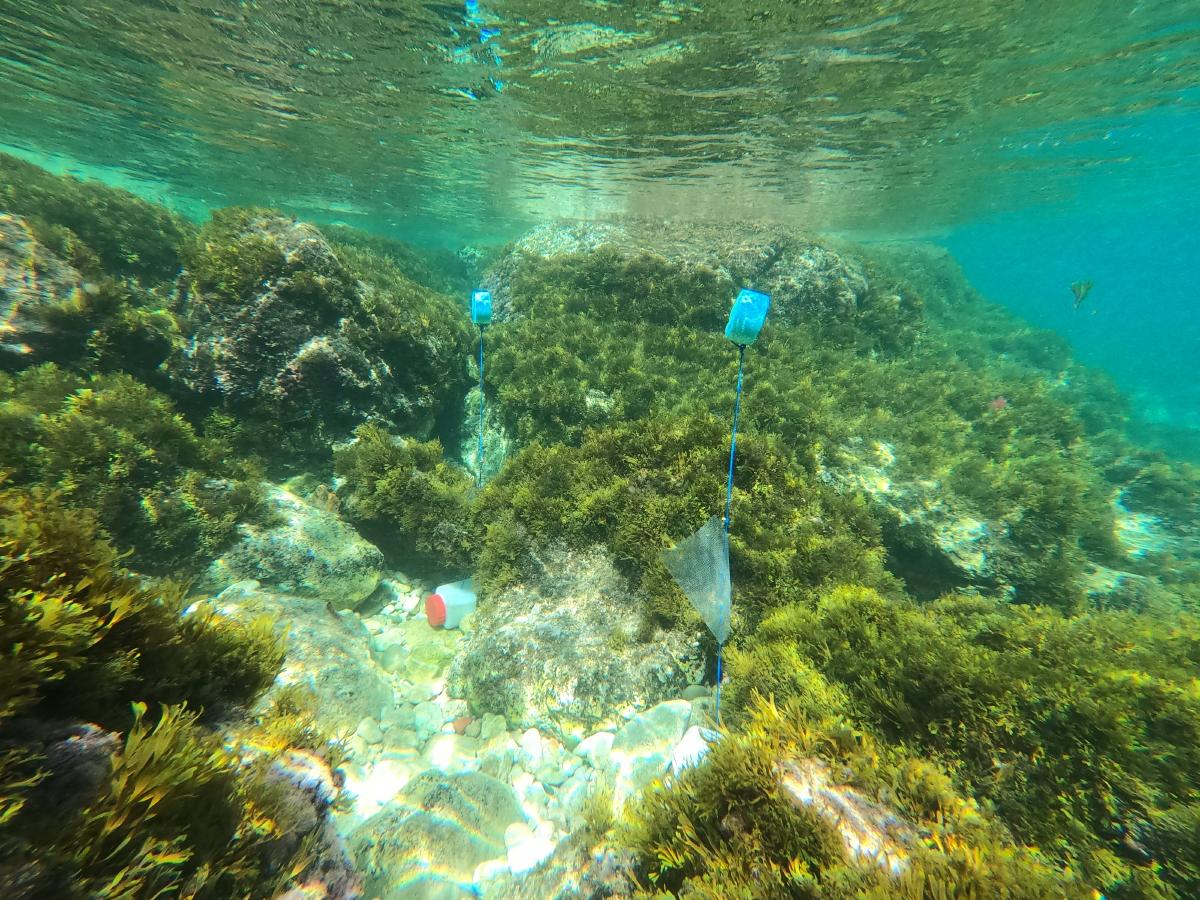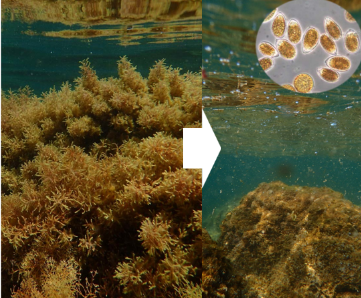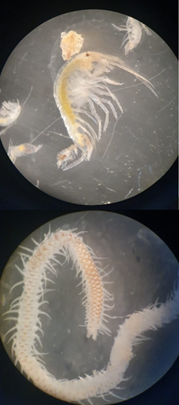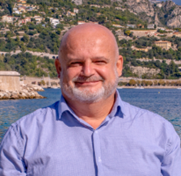Academy of Excellence "Territories, Environments, Risks and Resilience"
The role of benthic communities in the production and transfer of marine microalgal toxins: environmental, health and economic considerations
A transdisciplinary “Ocean One Health” approach bridging marine biodiversity conservation, food safety, human health and wellbeing, and the blue economy to address harmful algal blooms in the Mediterranean Sea.

Academy 3 highlight
The problem of harmful algal blooms in marine environments, especially those generating toxins, spans environmental concerns, human and animal health impacts, food safety threats, and socioeconomic repercussions. It falls within the scope of threats on oceans and coastal areas (SDG 14), and also intersects with broader themes of “anthropogenic health and environmental risks” (SDG 2, 3, 13).
The project
Countries worldwide are facing, directly or indirectly, issues with harmful algal blooms (HABs, naturally occurring proliferations of microscopic algae) that result in adverse effects on the environment as well as on animal and human health. Major HAB events lead to mass mortalities of marine organisms, aquaculture and fisheries closures, beach closures, food contamination with biotoxins above safety levels or human intoxications (IOC Global Harmful Algal Bloom Status Report, 2021), resulting in significant economic losses in the tourism, fishing and aquaculture sectors.
In the Mediterranean, HAB events have increased over the last 30 years, and those in benthic systems are particularly concerning. They mainly involve the toxic species Ostreopsis cf. ovata, which reappears every year, covering macroalgal communities and rocky shores and evolving into mucilaginous floating aggregates that can cause massive mortalities of marine organisms and human illnesses through skin contact and inhalation of aerosols. Additionally, other benthic species belonging to the genus Gambierdiscus are seen as emerging threats in the Mediterranean. Widespread in tropical coral reefs, these dinoflagellates produce potent neurotoxins that accumulate in fish and are responsible for ciguatera, the most common form of food poisoning from correctly preserved fish worldwide.
In both the Mediterranean and tropical coral reef areas, abrupt changes associated with global change (multiple stressors directly linked to climate and human activities, including coastal urbanization, tourism, overfishing, water quality, etc.) are leading to significant habitat deterioration (known as “regime shift”) and are suspected to play a significant role in the emergence and toxicity of toxic microalgae. In these deteriorated habitats, toxic benthic microalgae appear to thrive. However, the mechanisms and ecological conditions that foster cell growth, along with facilitating toxin production and transfer in these altered habitats remain to be elucidated.
The BENTOX+ project aims to establish a research program at UniCA to address these knowledge gaps. It adopts a "One Health" transdisciplinary approach, applied within the context of a Blue Economy. Our approach involves ecology, toxicology, ecotoxicology and chemistry, as well as socioeconomics, and fosters partnerships among scientists from different disciplines, intergovernmental agencies and program representatives, in addition to public health professionals and natural coastal managers.
More precisely, by exploring the ecological factors influencing toxic algae growth, assessing health risks, and estimating economic impacts, the project’s objectives are to enhance marine ecosystem understanding, develop management tools, and promote sustainable practices.
Ecology, Ecotoxicology, Chemistry: Exploration of the enigmatic influence of marine benthic community assemblages on algal toxin dynamics. Assessing Ostreopsis toxin levels and effects along the food chain in preserved and degraded habitats, through sample extraction, metabolite analysis, and toxicity testing on laboratory animal and cellular models.
Toxicology: Evaluation of seafood contamination and the resulting environmental and human health risks, through the establishment of a Mediterranean network on HABs and a review of available data on HAB and associated biotoxin occurrences.
Socioeconomic Evaluation: Analysis of the economic cost of direct and indirect impacts of HABs.


The +
The project stands out by its transdisciplinary One Health methodology to address harmful algal blooms. It involves rigorous field and laboratory investigations with comprehensive socioeconomic analysis, and fosters partnerships between academics and stakeholders.
What’s next?
Once we have characterized benthic assemblages and identified key organisms introducing toxins to the food web of the Mediterranean Sea, we will then seek to transpose this approach to the Pacific region and develop models to better predict toxin transfer and better manage foodborne poisoning.
How does the project contribute to the transdisciplinary ambition?
Ecotoxicology - ECOSEAS
The ECOSEAS team is developing a deeper understanding of marine ecosystems, fostering their conservation and management within the context of sustainable development, while promoting awareness through communication and education.
Toxicology- IRCAN
Dedicated to research in cancer biology, the IRCAN team will provide the expertise to assess the toxicity of isolated metabolites using advanced in vitro methodologies.
Chemistry - ICN
The ICN team specializes in researching natural compounds, investigating their properties and applications using mass spectrometry. Collaboration with IRCAN and ECOSEAS is essential for precise identification and toxicological characterization of isolated compounds.
Socioeconomics - CSM
CSM is performing analyses of the economic cost of HABs, identifying opportunities for sustainable growth, and providing strategic recommendations to support economic development initiatives.
Socioeconomics - Plan Bleu
Plan Bleu is promoting the conservation and sustainable management of marine and coastal resources in the Mediterranean, by providing scientific analysis and policy recommendations to governments and stakeholders.
Project information
|
Scientific domain
Ecotoxicology Chemistry Socioeconomics |
Key words Biotoxins Food safety Blue Economy Biodiversity Sustainable development |
|
Total budget
€214,000, including €104,000 from Academy 3
|
Start of the project
2023 |
| Partners ECOSEAS - Université Côte d’Azur, CNRS ICN - Université Côte d’Azur, CNRS IRCAN - Université Côte d’Azur, CNRS, Inserm LOV – IMEV, CNRS, Sorbonne Université Centre Scientifique de Monaco Plan Bleu - UNEP UniGe - Italie Students involved Guillaume Barnouin (PhD) Zoé Arrigoni (Pharmacie) Amandine Couturier (M2) Melissa Richard (M2) Kylene Flynn (M1) |
Project members Marie-Yasmine Bottein Luisa Mangialajo Mohamed Mehiri Maeva Duffies Gilles Pages Rodolphe Lemée Antoine Lafitte International collaborations Nathalie Hilmi - CSM, Carlos Alonso – AIEA, Monaco Chiantore – DiSTAV, Università di Genova Rachel Clausing – DiSTAV, Università di Genova |

Marie-Yasmine Dechraoui Bottein
ECOSEAS - Université Côte d’Azur, CNRS

Gilles Pages
IRCAN - Université Côte d’Azur, CNRS, Inserm

Mohamed Mehri
ICN - Université Côte d’Azur, CNRS
Scientific promotion of the project
Publication
- Tissue Distribution and Metabolization of Ciguatoxins in an Herbivorous Fish following Experimental Dietary Exposure to Gambierdiscus polynesiensis
- Rachel J. Clausing, Hela Ben Gharbia, Khalil Sdiri , Manoella Sibat , Ma. Llorina Rañada-Mestizo, et al. Marine drugs, 2024, 22 (1), 14 (22p.). ⟨10.3390/md22010014⟩ https://www.mdpi.com/1660-3397/22/1/14
Poster:
- One-day conference of the French society of toxinology"Tools for Sampling and Screening Ostreopsis and Its Associated Toxins in the Benthic Compartment" http://sfet.asso.fr/programme-rt29.html
- Annual seminar of IFR MARRES “Unveiling the Harmful Algal Bloom Puzzle in the Mediterranean Sea through a one health approach” March 26; 2024, Hotel Saint Paul, Nice
Oral:
- International Conference on harmful Algae, Hiroshima, Japan, 2023 "Benthic Harmful Algal Blooms in the Mediterranean Sea and the tropics: threats and opportunities" https://icha2023.org/
- International Conference on harmful Algae, Hiroshima, Japan, 2023 "The role of habitat dynamics in the facilitation of Ostreopsis spp. blooms" https://icha2023.org/
- Symposium LIA ROPSE Monaco "Health impact and associated costs of harmful algal blooms in the Mediterranean basin"




















